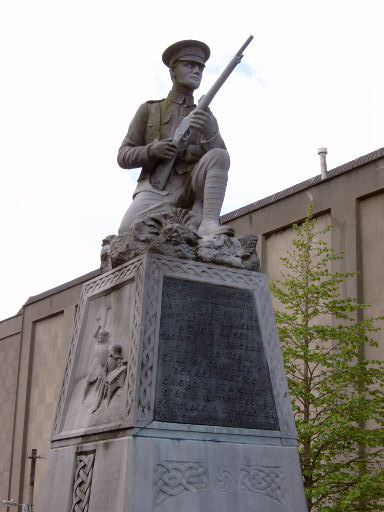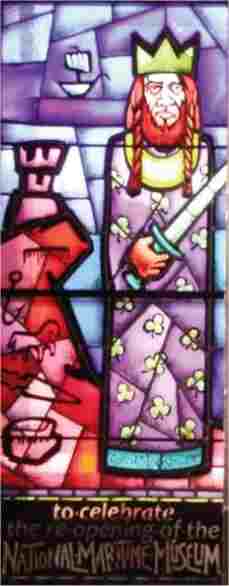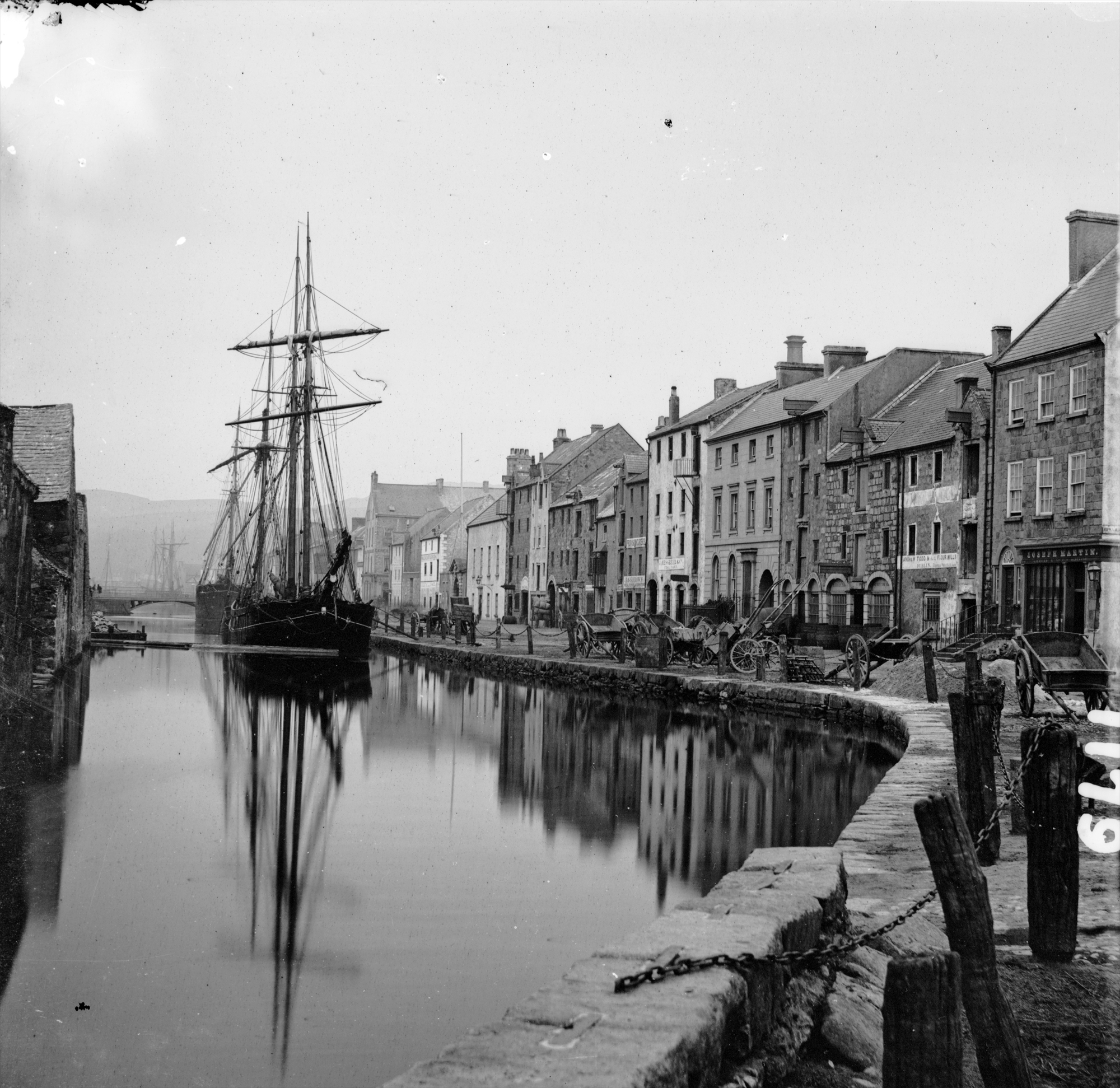|
1913 In Ireland
Events from the year 1913 in Ireland. Events *13 January – Edward Carson founds the Ulster Volunteer Force by unifying several existing loyalist militias. *30 January – at Westminster the House of Lords rejects the 3rd Home Rule Bill by 326 to 69. *10 February – John Redmond opens the replacement city bridge over the River Suir in Waterford that will be named after him. *7 July – the Home Rule Bill is once again carried in the House of Commons, despite attempts by Bonar Law to obstruct it. *26 August – Dublin Lock-out: members of James Larkin's Irish Transport and General Workers' Union employed by the Dublin United Tramways Company begin strike action in defiance of the dismissal of trade union members by the chairman, businessman William Martin Murphy. *31 August – Dublin Lock-out: the Dublin Metropolitan Police kill one demonstrator and injure 400 in dispersing a demonstration in Sackville Street (Dublin). *1 September – protest by locked-out workers lead to ser ... [...More Info...] [...Related Items...] OR: [Wikipedia] [Google] [Baidu] |
Edward Carson
Edward Henry Carson, 1st Baron Carson, PC, PC (Ire) (9 February 1854 – 22 October 1935), from 1900 to 1921 known as Sir Edward Carson, was an Irish unionist politician, barrister and judge, who served as the Attorney General and Solicitor General for England, Wales and Ireland as well as the First Lord of the Admiralty for the British Royal Navy. From 1905 Carson was both the Irish Unionist Alliance MP for the Dublin University constituency and leader of the Ulster Unionist Council in Belfast. In 1915, he entered the war cabinet of H. H. Asquith as Attorney-General. Carson was defeated in his ambition to maintain Ireland as a whole in union with Great Britain. His leadership, however, was celebrated by some for securing a continued place in the United Kingdom for the six north-eastern counties, albeit under a devolved Parliament of Northern Ireland that neither he nor his fellow unionists had sought. He is also remembered for his open ended cross examination of Oscar Wild ... [...More Info...] [...Related Items...] OR: [Wikipedia] [Google] [Baidu] |
Dublin Metropolitan Police
The Dublin Metropolitan Police (DMP) was the police force of Dublin, Ireland, from 1836 to 1925, when it was amalgamated into the new Garda Síochána. History 19th century The Dublin city police had been subject to major reforms in 1786 and 1808.Stanley H. Palmer, ' Drummond, Thomas (1797–1840)', Oxford Dictionary of National Biography, Oxford University Press, 2004; online edn, Jan 2008 Organised rural policing in Ireland began when Robert Peel, then Chief Secretary for Ireland, created the Peace Preservation Force in 1814. This rudimentary paramilitary police force was designed to provide policing in rural Ireland, replacing the 18th century system of watchmen, baronial constables, revenue officers and British military forces. Peel went on to found the London Metropolitan Police. In 1822, a new Act created four improved "County" Constabularies, whose organisation was based around the traditional provinces of Ireland. 1836: reform In 1836, the county constabularies we ... [...More Info...] [...Related Items...] OR: [Wikipedia] [Google] [Baidu] |
Gaelic League
(; historically known in English as the Gaelic League) is a social and cultural organisation which promotes the Irish language in Ireland and worldwide. The organisation was founded in 1893 with Douglas Hyde as its first president, when it emerged as the successor of several 19th century groups such as the Gaelic Union. The organisation would be the spearhead of the Gaelic revival and ''Gaeilgeoir'' activism. Originally the organisation intended to be apolitical, but many of its participants became involved in the republican movement and the struggle for Irish statehood. History 'De-Anglicising Ireland" ''Conradh na Gaeilge'', the Gaelic League, was formed in 1893 at a time Irish as a spoken language appeared to be on the verge of extinction. Analysis of the 1881 Census showed that at least 45% of those born in Ireland in the first decade of the 19th century had been brought up as Irish speakers. Figures from the 1891 census suggested that just 3.5% were being raised speak ... [...More Info...] [...Related Items...] OR: [Wikipedia] [Google] [Baidu] |
Irish Volunteers
The Irish Volunteers ( ga, Óglaigh na hÉireann), sometimes called the Irish Volunteer Force or Irish Volunteer Army, was a military organisation established in 1913 by Irish nationalists and republicans. It was ostensibly formed in response to the formation of its Irish unionist/loyalist counterpart the Ulster Volunteers in 1912, and its declared primary aim was "to secure and maintain the rights and liberties common to the whole people of Ireland". The Volunteers included members of the Gaelic League, Ancient Order of Hibernians and Sinn Féin, and, secretly, the Irish Republican Brotherhood (IRB). Increasing rapidly to a strength of nearly 200,000 by mid-1914, it split in September of that year over John Redmond's commitment to the British war effort, with the smaller group retaining the name of "Irish Volunteers". Formation Background Home Rule for Ireland dominated political debate between the two countries since Prime Minister William Ewart Gladstone introduced the f ... [...More Info...] [...Related Items...] OR: [Wikipedia] [Google] [Baidu] |
Eoin MacNeill
Eoin MacNeill ( ga, Eoin Mac Néill; born John McNeill; 15 May 1867 – 15 October 1945) was an Irish scholar, Irish language enthusiast, Gaelic revivalist, nationalist and politician who served as Minister for Education from 1922 to 1925, Ceann Comhairle of Dáil Éireann from 1921 to 1922, Minister for Industries 1919 to 1921 and Minister for Finance January 1919 to April 1919. He served as a Teachta Dála (TD) from 1918 to 1927. He was a Member of Parliament (MP) for Londonderry City from 1918 to 1922 and a Member of the Northern Ireland Parliament (MP) for Londonderry from 1921 to 1925. A key figure of the Gaelic revival, MacNeill was a co-founder of the Gaelic League, to preserve Irish language and culture. He has been described as "the father of the modern study of early Irish medieval history". He established the Irish Volunteers in 1913 and served as Chief-of-Staff of the minority faction after its split in 1914 at the start of the World War. He held that positio ... [...More Info...] [...Related Items...] OR: [Wikipedia] [Google] [Baidu] |
Hunger Strike
A hunger strike is a method of non-violent resistance in which participants fast as an act of political protest, or to provoke a feeling of guilt in others, usually with the objective to achieve a specific goal, such as a policy change. Most hunger strikers will take liquids but not solid food. In cases where an entity (usually the state) has or is able to obtain custody of the hunger striker (such as a prisoner), the hunger strike is often terminated by the custodial entity through the use of force-feeding. Early history Fasting was used as a method of protesting injustice in pre-Christian Ireland, where it was known as ''Troscadh'' or ''Cealachan''. Detailed in the contemporary civic codes, it had specific rules by which it could be used. The fast was often carried out on the doorstep of the home of the offender. Scholars speculate that this was due to the high importance the culture placed on hospitality. Allowing a person to die at one's doorstep, for a wrong of which o ... [...More Info...] [...Related Items...] OR: [Wikipedia] [Google] [Baidu] |
Dún Laoghaire
Dún Laoghaire ( , ) is a suburban coastal town in Dublin in Ireland. It is the administrative centre of Dún Laoghaire–Rathdown. The town was built following the 1816 legislation that allowed the building of a major port to serve Dublin. It was known as Dunleary until it was renamed Kingstown in honour of King George IV's 1821 visit, and in 1920 was given its present name, the original Irish form of Dunleary. Over time, the town became a residential location, a seaside resort and the terminus of Ireland's first railway. Toponymy The town's name means "fort of Laoghaire". This refers to Lóegaire mac Néill (modern spelling: Laoghaire Mac Néill), a 5th century High King of Ireland, who chose the site as a sea base from which to carry out raids on Britain and Gaul. Traces of fortifications from that time have been found on the coast, and some of the stone is kept in the Maritime Museum. The name is officially spelt Dún Laoghaire in modern Irish orthography; sometime ... [...More Info...] [...Related Items...] OR: [Wikipedia] [Google] [Baidu] |
Trade Union
A trade union (labor union in American English), often simply referred to as a union, is an organization of workers intent on "maintaining or improving the conditions of their employment", ch. I such as attaining better wages and benefits (such as holiday, health care, and retirement), improving working conditions, improving safety standards, establishing complaint procedures, developing rules governing status of employees (rules governing promotions, just-cause conditions for termination) and protecting the integrity of their trade through the increased bargaining power wielded by solidarity among workers. Trade unions typically fund their head office and legal team functions through regularly imposed fees called ''union dues''. The delegate staff of the trade union representation in the workforce are usually made up of workplace volunteers who are often appointed by members in democratic elections. The trade union, through an elected leadership and bargaining committee, ... [...More Info...] [...Related Items...] OR: [Wikipedia] [Google] [Baidu] |
Dublin
Dublin (; , or ) is the capital and largest city of Republic of Ireland, Ireland. On a bay at the mouth of the River Liffey, it is in the Provinces of Ireland, province of Leinster, bordered on the south by the Dublin Mountains, a part of the Wicklow Mountains range. At the 2016 census of Ireland, 2016 census it had a population of 1,173,179, while the preliminary results of the 2022 census of Ireland, 2022 census recorded that County Dublin as a whole had a population of 1,450,701, and that the population of the Greater Dublin Area was over 2 million, or roughly 40% of the Republic of Ireland's total population. A settlement was established in the area by the Gaels during or before the 7th century, followed by the Vikings. As the Kings of Dublin, Kingdom of Dublin grew, it became Ireland's principal settlement by the 12th century Anglo-Norman invasion of Ireland. The city expanded rapidly from the 17th century and was briefly the second largest in the British Empire and sixt ... [...More Info...] [...Related Items...] OR: [Wikipedia] [Google] [Baidu] |
Belfast
Belfast ( , ; from ga, Béal Feirste , meaning 'mouth of the sand-bank ford') is the capital and largest city of Northern Ireland, standing on the banks of the River Lagan on the east coast. It is the 12th-largest city in the United Kingdom and the second-largest in Ireland. It had a population of 345,418 . By the early 19th century, Belfast was a major port. It played an important role in the Industrial Revolution in Ireland, briefly becoming the biggest linen-producer in the world, earning it the nickname "Linenopolis". By the time it was granted city status in 1888, it was a major centre of Irish linen production, tobacco-processing and rope-making. Shipbuilding was also a key industry; the Harland and Wolff shipyard, which built the , was the world's largest shipyard. Industrialisation, and the resulting inward migration, made Belfast one of Ireland's biggest cities. Following the partition of Ireland in 1921, Belfast became the seat of government for Northern Ireland ... [...More Info...] [...Related Items...] OR: [Wikipedia] [Google] [Baidu] |
Ulster
Ulster (; ga, Ulaidh or ''Cúige Uladh'' ; sco, label= Ulster Scots, Ulstèr or ''Ulster'') is one of the four traditional Irish provinces. It is made up of nine counties: six of these constitute Northern Ireland (a part of the United Kingdom); the remaining three are in the Republic of Ireland. It is the second-largest (after Munster) and second-most populous (after Leinster) of Ireland's four traditional provinces, with Belfast being its biggest city. Unlike the other provinces, Ulster has a high percentage of Protestants, making up almost half of its population. English is the main language and Ulster English the main dialect. A minority also speak Irish, and there are Gaeltachtaí (Irish-speaking regions) in southern County Londonderry, the Gaeltacht Quarter, Belfast, and in County Donegal; collectively, these three regions are home to a quarter of the total Gaeltacht population of Ireland. Ulster-Scots is also spoken. Lough Neagh, in the east, is the largest lake i ... [...More Info...] [...Related Items...] OR: [Wikipedia] [Google] [Baidu] |
Newry
Newry (; ) is a city in Northern Ireland, divided by the Clanrye river in counties Armagh and Down, from Belfast and from Dublin. It had a population of 26,967 in 2011. Newry was founded in 1144 alongside a Cistercian monastery, although there are references to earlier settlements in the area, and is one of Ireland's oldest towns. The city is an entry to the " Gap of the North", from the border with the Republic of Ireland. It grew as a market town and a garrison and became a port in 1742 when it was linked to Lough Neagh by the first summit-level canal built in Ireland or Great Britain. A cathedral city, it is the episcopal seat of the Roman Catholic Diocese of Dromore. In 2002, as part of Queen Elizabeth's Golden Jubilee celebrations, Newry was granted city status along with Lisburn. Name The name Newry is an anglicization of ''An Iúraigh'', an oblique form of ''An Iúrach'', which means "the grove of yew trees". The modern Irish name for Newry is ''An tIúr'' ( ... [...More Info...] [...Related Items...] OR: [Wikipedia] [Google] [Baidu] |
.jpg)






.png)
